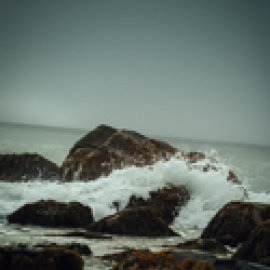The Internal Price on Nature
-
English
-
ListenPause
[intro music]
Welcome to World Ocean Radio...
I’m Peter Neill, Director of the World Ocean Observatory.
As we review the state of climate change challenge and response, it becomes clear we are not succeeding. The recent COP 27 meeting has been deemed a failure, both in resolve and finance. Various standards and measures, such as ESG, have been co-opted and discredited. Corporations are faced with resistance by any diminishment of shareholder value and market response. Credit schemes and green investments are revealed as hypocritical or ineffective. Change is hard, and harder when we are stuck in a gyre of conventional definitions, policies, politics, and economics. We cannot get beyond a methodology that has failed, as both process and function. We are frozen in a consumption-driven, GDP-measured, free market-sustained, vested interest-protected system which, given continuing decline, has failed us.
Here is a question: Can there be a “new economics?” We have explored here on World Ocean Radio many different approaches to sustainability finance – investment instruments, accounting practices, alternative technologies, and innovative practices – but these get lost in the uncertainty of an evolutionary approach, small modifications from within, stymied by the resistance of inertia and fear of change.
Radical change, revolutionary action meets fierce political opposition – “too much, too soon” perpetuating “too little, too late.” It is, indeed, a gyre, an irrational downward spiral from which we might be spit out downstream, but in which we might just as easily drown.
Is there a “pro-volutionary” approach? Could we conceive a new economics, a forward-directed system of financial valuation and exchange that is based on the asset value of Nature: defined, monetized, exchanged, accounted for, and sustained by a new system of measurement, inclusive of externalities, to present a new calculation by which to guide new patterns for policy, governance, investment, development, and return?
In Das Capital, Karl Marx writes: “Capitalist production…disturbs the metabolic interaction between man and the earth.” It is a double-truth: isn’t this both the core of the problem we face today, and its solution?
In ECOLOGY AND SOCIALISM: Solutions to Capitalist Ecological Crisis (Haymarket Books 2010), author Chris Williams argues that only socialism can provide a political means to those ends. European “democratic socialism” and the “green New Deal” are attempts to affect ecological change, but these are challenged by traditional politics and market uncertainty. Do we really need to change our form of government to change the governance itself? Isn’t there another way?
Is it possible to craft a “new economics” that redefines capital as an asset most valuable by its sustainability, not depletion, of natural resources? Is it the possible to incorporate that new value definition into novel investment activity that adds value by ingenuity and innovation and provides for societal needs (work, shelter, health, even profit)? Could the new valuation, that includes the cost of externalities and consequence (downstream effect, insurance, repair, and mitigation), not persuade investors that there is return to be earned, perhaps not at usurious rates, but sustained and adequate for the future welfare and security of a rapidly expanding, interconnected world?
Could there be a new economics based on Nature, the most valuable asset on earth, enabled by capital focused on sustainability and public profit? How could that come to be?
In a recent onearth article, re-posted on Medium, Karl Burkart describes the concept of setting an “internal price on Nature” as a corporate approach to “net zero” climate neutrality, not through tradable offsets that only maintain the status quo, but through revised internal administrative and management changes to include review of the relation of corporate impacts on ecosystems and biodiversity, internal assessment of supply chain and procurement sources, re-engineering of processes to reduce environmental degradation, including the cost of externalities, in its financial analyses and accounting – in effect, “taxing” itself from within, through an internal allocation to set aside funds to finance reform and pursue alternative practice. Sustainability would become “an operating cost.” Change would be financed by the business itself, not imposed from without, reducing public relations risk, regulatory and legal risk, and material risk against over-exploitation of natural resources to depletion. Change would be implemented as a contribution to responsible long-term business practice, and shareholder value would be enhanced long-term to finance the future. Change would “pro-volve” as a creative strategy to counter frustration, in-action, uncertainty, and the inevitable loss when the true source of capital, Nature, metabolic as it nurtures all aspects of the relation between humankind and earth, is acknowledged and restored.
We will discuss these issues, and more, in future editions of World Ocean Radio.
[outro music]
As we review the state of climate change challenge and response, it becomes clear we are not succeeding. Is it possible to craft a new economic system that values natural resource sustainability over depletion of those resources? Can we conceive a new economics, a forward-directed system of financial valuation and exchange based on the asset value of Nature? We're discussing this and more this week on World Ocean Radio.
About World Ocean Radio
World Ocean Radio is a weekly series of five-minute audio essays available for syndicated use at no cost by college and community radio stations worldwide. Peter Neill, Director of the World Ocean Observatory and host of World Ocean Radio, provides coverage of a broad spectrum of ocean issues from science and education to advocacy and exemplary projects.
World Ocean Radio
14 Years, 700+ Episodes
Ocean is climate
Climate is ocean
The sea connects all things
- Login to post comments



